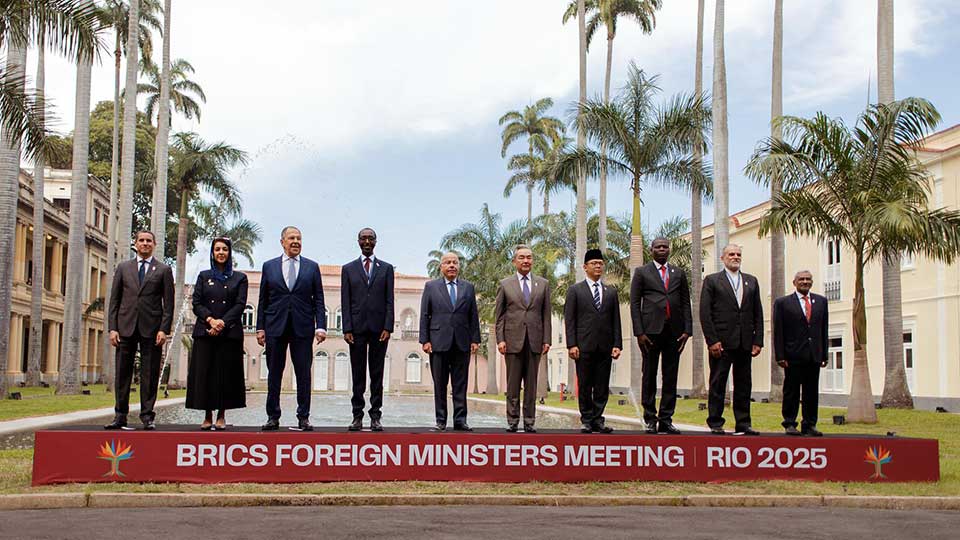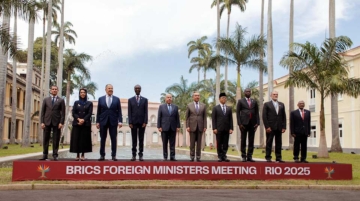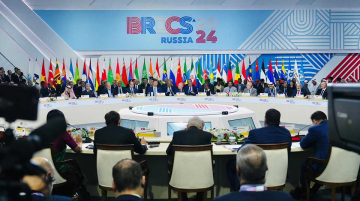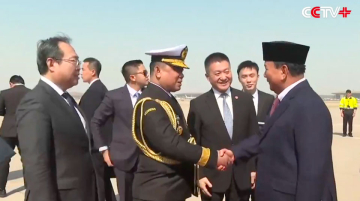
In Rio de Janeiro this week, Indonesia made its debut on the BRICS stage—not as an invited guest, but as a full member. Foreign Minister Sugiono’s presence at the BRICS Foreign Ministers’ Meeting marked a milestone in Jakarta’s evolving approach to multilateral diplomacy, reflecting a growing confidence and ambition in global affairs.
Though overshadowed by the intensifying U.S.-China rivalry and the disruptive rhetoric of Donald Trump’s renewed tariff crusade, Indonesia’s performance at the BRICS forum was quietly significant. It offered insight into how Southeast Asia’s largest economy is positioning itself within an expanded Global South coalition—and what it hopes to achieve.
From Bystander to Builder
Since its official accession to BRICS in January 2025, Indonesia has framed its membership as more than symbolic. At the meetings in Rio, Sugiono reaffirmed Indonesia’s commitment to “strengthening multilateralism” and “helping resolve global challenges.” These phrases, while common in diplomatic speak, signal a shift in tone for a country long wary of great power entanglements.
In a bilateral meeting with Brazilian Foreign Minister Mauro Vieira, Sugiono thanked Brazil—currently holding the BRICS chair—for its support of Indonesia’s membership. Vieira, in turn, encouraged President Prabowo Subianto to attend the BRICS Summit in July, a move that would further cement Indonesia’s role in the group.

This growing rapport between Indonesia and Brazil, both self-described “middle powers,” underlines one of the more subtle but strategic goals of Indonesia’s BRICS participation: forging partnerships among states that are too big to be ignored, but not powerful enough to dictate global norms alone.
Calling for Global Reform
Indonesia’s interventions during the meeting were unusually pointed. In the session on global and regional crises, Minister Sugiono cited the humanitarian catastrophe in Gaza as evidence of the international system’s failure to uphold legal and moral standards.
“BRICS must take the lead in defending international law,” he said, emphasizing that its enforcement must be “fair, consistent, and without double standards.” He warned against the selective application of legal norms and called for greater respect for the International Court of Justice and a more empowered UN Security Council.
These remarks—made in the presence of major powers like China and Russia—represent an assertive diplomatic posture from Indonesia. It is staking a claim not only as a participant in global governance debates but as a moral voice within the Global South. This may resonate with countries frustrated by the West’s perceived inconsistency on international law, especially regarding conflicts in the Middle East and beyond.
Reforming Multilateral Institutions
Perhaps the most consequential of Sugiono’s messages came in the session on institutional reform. He called for the expansion of the UN Security Council, increased representation of developing countries in financial institutions, and a stronger World Health Organization to address future pandemics.
This reflects Indonesia’s long-standing frustration with the architecture of global governance, which remains largely shaped by post-World War II power dynamics. But it also illustrates Jakarta’s careful balancing act: demanding reform without alienating the very powers whose cooperation it still needs.
Notably, Indonesia also announced its intent to join the BRICS-led New Development Bank—a move that adds substance to its membership and aligns with its desire to expand access to development financing outside of traditional Western-dominated channels.
From Free Lunch to Food Security
On the sidelines of the foreign ministers’ gathering in Rio, Sugiono’s bilateral talks with his Brazilian counterpart yielded another key takeaway: shared priorities in food and energy security, education, and human capital development. Both governments are advancing national programs to combat poverty and improve child nutrition—Indonesia’s free school meals initiative echoes Brazil’s longstanding social welfare policies.
These areas of cooperation may lack the headline appeal of geopolitics or tariffs, but they are foundational to how Indonesia views its role in BRICS. For Jakarta, the bloc is not just a platform to critique the West; it is also a space to craft practical South-South cooperation on issues that directly affect its citizens.
A Quietly Strategic Bet
Indonesia’s entry into BRICS is not without risk. The group’s diversity—now comprising 11 members ranging from autocracies to democracies, oil giants to emerging manufacturers—makes consensus difficult. Its ability to act as a coherent force remains in question.
But Indonesia appears to be betting on the long game. Rather than aligning itself blindly with anti-Western rhetoric or great power competition, Jakarta is trying to shape BRICS into a more effective multilateral forum—one that addresses real-world challenges without becoming hostage to ideological agendas.
This strategy echoes Indonesia’s doctrine of politik bebas aktif—an “independent and active” foreign policy—updated for an age of global fragmentation.
If President Prabowo does attend the July summit, it will further signal that Indonesia is serious about turning BRICS from a talking shop into a tool for inclusive global governance. Whether it succeeds will depend not just on its rhetoric, but on its ability to marshal coalitions within BRICS, bridge divides, and deliver concrete results.
Still, one thing is clear after this week in Rio: Indonesia is no longer on the sidelines of global diplomacy. It is stepping onto the field, not with bravado, but with quiet determination.
This article was co-authored by Yeta Purnama, a researcher at the Center of Economic and Law Studies (CELIOS), and Muhammad Zulfikar Rakhmat, Director of the China-Indonesia Desk at CELIOS.






